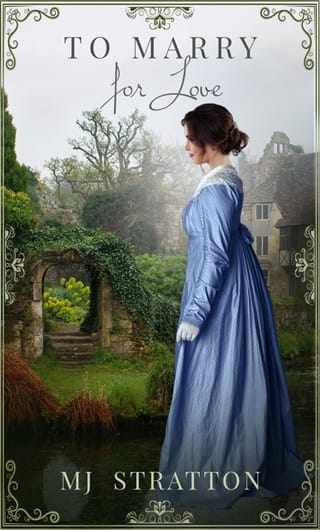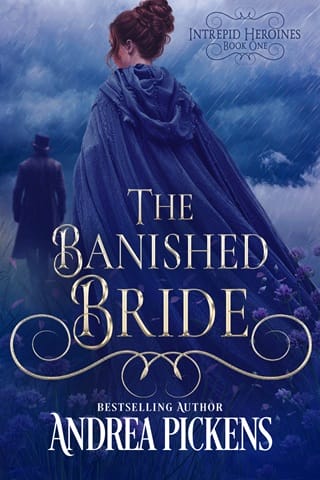15. Chapter Fifteen
Chapter Fifteen
March 26, 1812 Rosings Park, Kent Elizabeth
T he invitation to dine at Rosings Park for the second time in a week came unexpectedly. Elizabeth had imagined that, given the arrival of her ladyship’s nephews, she would have little use for the party from the parsonage. The invitation they had received before Mr. Darcy and Colonel Fitzwilliam had arrived had, in Elizabeth’s opinion, been granted simply to aid Lady Catherine support against her disagreeable de Bourgh relations. Elizabeth had not minded. Lady de Bourgh’s war against Lady Catherine had provided ample amusement and plenty of character study.
Mr. Collins’s verbosity knew no bounds. “How magnanimous my patroness is! Never did I imagine we would be so favored. Surely, this is a testament to her approval, dear Jane. She has welcomed you and now her condescension has spread to our family… and our other guest, of course.”
His words faltered. His mention of Charlotte felt like an afterthought. Elizabeth had detected some reluctance on her cousin’s part to being in Charlotte’s presence and she wondered about it. They had seemed friendly in Hertfordshire. Mr. Collins had even spent two days at Lucas Lodge following his failed proposal to Elizabeth.
They arrived at Rosings Park and were promptly admitted to Lady Catherine’s favored sitting room. Her ladyship sat on a settee; her usual seat occupied by Lady de Bourgh. Lady Catherine’s displeasure as she glared at her mother-in-law caused Mr. Collins to swallow hard. The poor man glanced from one lady to the other, likely wondering which he ought to greet first. His loyalty to his patroness won out and he bowed low to Lady Catherine.
His subservience mollified her ladyship some, and she greeted the rest of the party from the parsonage politely, if not warmly. Several conversations soon sprang up in the room. Lady Catherine spoke with Mr. Darcy and her daughter. Her strident tones carried across the room to where Elizabeth sat with Charlotte and Sir Andrew.
“When will you make your engagement official, Darcy?” she asked. “This delay has gone on long enough. Anne will be five-and-twenty next month. What say you to a May wedding?”
“I have no intention of marrying in May.” Mr. Darcy’s reply was vague. It neither agreed with his aunt’s supposition that he would marry her daughter, nor did it decry it.
“Then in June?”
“Aunt, this is neither the time nor the place to discuss this.” Mr. Darcy’s tone censured the lady for her lack of discretion, and he turned away from her to speak to Colonel Fitzwilliam.
“Poor Aunt Catty.” Sir Andrew tut-tutted with false sympathy. “It will infuriate her when Darcy marries against her inclination.”
Elizabeth turned to the gentleman in surprise. “Is he not engaged to Miss de Bourgh?” Mr. Wickham had assured her that the engagement was of some duration. Had he been incorrect?
“Only in Lady Catherine’s mind does the engagement exist.” Sir Andrew smiled conspiratorially. “Darcy doubtlessly wishes to avoid confrontation. His desire for peace overrides his good sense. He has had years to disabuse our mutual aunt of her wishes and has not done so. Now, Anne is almost five-and-twenty and nearly on the shelf. My cousin has never been to town and her prospects are slim. Rosings Park is an inducement, I suppose, but Lady Catherine will not marry her daughter to just anyone. She loves her and believes that Darcy is the very best match for Anne. Oh, yes, it will be a sight to behold when Aunt Catherine’s hopes are finally put to rest. I do hope I am here to see it.”
“Will she not turn to you to marry your cousin in Mr. Darcy’s place? It seems an ideal situation.” Elizabeth regarded him curiously.
Sir Andrew chuckled. “No, I do not believe she will.”
When he did not expound, Elizabeth frowned and turned away to speak with Charlotte. “What can he mean by that, dear Charlotte? Does Sir Andrew mean to tease us by withholding his suppositions? Why would Lady Catherine forgo such an excellent match for her daughter in lieu of Mr. Darcy?”
Charlotte sighed. “It is because she wishes to retain control of Rosings Park, Eliza. Sir Andrew has related his suppositions to me. I shall tell you all later.”
The butler called dinner and the party filed into the dining room. Lady de Bourgh maintained her seat at one end of the table but left Lady Catherine to her seat. The guests sat themselves to their preference, given the informal nature of the evening. In consequence, Elizabeth ended up seated between Sir Andrew and Mr. Darcy. The former she tolerated despite his insult to her friend; the latter she bemoaned. Mr. Darcy had proven he could converse amiably, but she did not believe he would do so in current company. Mr. Collins displayed his ridiculous behavior just across the table, and there would surely be a battle of wills between Lady de Bourgh and Lady Catherine.
The footmen served a soup that smelled heavenly, and Elizabeth delicately took a sip. The rich flavors were delightful, and she sighed a little in pleasure.
“My aunt’s cook is exceptional.” Mr. Darcy spoke from beside her, his deep voice rumbling quietly so as not to draw attention from the head of the table.
“I have enjoyed Rosings Park’s hospitality several times since arriving in Kent.” I already told him that, she mused, silently rebuking him for interrupting her meal. But politeness dictated that she share conversation with him for the course.
“Have you been in Kent long?”
Elizabeth took another spoonful of soup before replying. “We arrived the fifth of March.”
Darcy nodded. “When are you to depart?”
“We are set to depart on April eleventh.” She lifted her glass and drank, hoping the beverage would aid in settling her mood.
“I am pleased that we have this opportunity to meet again.”
She turned and looked at him, aghast. “I have ascribed many words to your reaction at seeing me here when you arrived but pleased is not one that I included.”
Darcy frowned, his brow furrowing. “What words did you ascribe?”
She smiled and replied cheekily. “I am afraid such disclosures would spoil the evening. Pray, let us partake of our meal without me causing any disquiet or disturbance with my words.”
He looked confused but nodded and they both returned to their soup. Not many minutes passed before he spoke again.
“How is Mrs. Collins faring in her new situation?"
Elizabeth preferred to avoid this topic, for she blamed Mr. Darcy for her sister’s present state. “Jane has risen to the occasion. I believe she has found contentment in her lot as Mrs. Collins.”
“I suppose your mother knew joy at having a daughter so well situated.” He sounded sardonic, and Elizabeth did not like the implication she heard in his tone.
“My mother is as pleased as any woman who disposes of a daughter in matrimony.” She stirred her soup as she contemplated her next words. “Mrs. Bennet has five daughters to marry off, and so her joy at knowing one of them well settled as you put it, can know no bounds.”
“Then I am happy for her.” The footmen appeared with the next course, effectively ending their conversation. Pleased with the change in conversation partners, she turned to Sir Andrew on her other side.
“I have never seen Darcy in such knots,” he said immediately.
“I do not know what you mean.” Mr. Darcy’s conversation had been much as it ever was in Hertfordshire.
“He is tripping over himself,” chortled Sir Andrew. “I have known Darcy since my twelfth year. Our grandmothers were great friends. Summers spent at Matlock are among the fondest of my memories. He has always been a serious individual but never has he lacked oratory skills.”
“Mr. Darcy presents himself the same here as he did when he resided at Netherfield Park.”
“And where is this Netherfield Park?” Sir Andrew asked.
“It is three miles from my home in Hertfordshire.” Elizabeth took a bite of her roast duck. The bird had been done to a turn, and the excellent flavor pleased her.
“I suppose I have never witnessed Darcy in society outside of his circles. Does he behave poorly?” Sir Andrew sounded curious, and Elizabeth wanted to enlighten him. Maybe Mr. Darcy would listen in and learn how his manner had disenchanted the denizens of Meryton.
Sir Andrew continued to question Elizabeth on many subjects during the second course and she answered to her best ability. His inquiries began with seeking information about Hertfordshire and her neighbors before turning to Charlotte.
“Have you been friends with Miss Lucas for some duration?” he asked. His nonchalant demeanor seemed too casual, too disinterested.
“Charlotte and I have known each other for as long as I can remember.” Elizabeth smiled. “Her father received his knighthood when I was seven. Charlotte’s family has always lived in Meryton, but Sir William purchased Lucas Lodge, the estate nearest to Longbourn, at that time. Lady Lucas is my mother’s best friend, and so we were often in company.”
“She is a singular lady to befriend a girl so much her junior.”
Elizabeth turned a questioning gaze on him. “You do not have gentleman friends that are younger than you? Do you imagine that ladies only find companionship with those who are of an age with them?”
“I meant no offense. You two simply make an odd pairing.” He shrugged.
“Why?”
“Miss Lucas strikes me as a practical, prudent, pragmatic individual. She is self-assured and seems like she is not easily shaken or upset. You, on the other hand, are vibrant, energetic, and verbose.”
“They say opposites attract.” Elizabeth felt defensive. Her friendship with Charlotte had been called many things but never odd.
“So, they do.” Sir Andrew fell silent, a look of contemplation on his face that Elizabeth had never witnessed.
The final course came and went, and Elizabeth suffered Mr. Darcy’s tedious and sometimes objectionable conversation before the ladies retreated to the sitting room.
“You will play this evening, Miss Bennet.” Lady Catherine’s command came as soon as she had settled herself on the settee next to Charlotte.
She attempted to demure, saying, “I did not prevaricate regarding my skills, madam. I play little, and very ill. I do not practice as I ought to please company with my playing.”
“Play, Miss Bennet. There are none here to censure you.”
“Really, Catherine, must you pester the poor girl so?” Lady de Bourgh’s predictable censure sounded from across the room.
One glance at Jane revealed her uneasiness as the two ladies glared at each other. Hoping to stall the inevitable battle, Elizabeth stood and moved toward the pianoforte, hoping her playing would stop the incoming argument before it started. She selected a piece she knew by heart and sat before the keyboard. Her playing filled the room, and she watched the rest of the assemblage over the top of the pianoforte.
The gentlemen were not absent from their company for long before they rejoined the ladies. Sir Andrew moved immediately to Charlotte’s side, taking Elizabeth’s spot on the settee. Colonel Fitzwilliam came toward the pianoforte. Mr. Darcy followed, but his aunt stalled him, commanding his attention for Miss de Bourgh.
“Miss Bennet.” Colonel Fitzwilliam stood by the instrument. “May I turn your pages for you?”
“I thank you for your solicitousness. I have this piece memorized but your aid will be invaluable when I select the next.”
“Your playing is charming. You imbue much feeling into the notes.” The colonel grinned. “I have witnessed many a lady in high society who plays with technical proficiency but lacks emotion.”
“You are harsh upon the ladies of your sphere,” Elizabeth teased. “Whatever shall we do? Perhaps inform the ton that their ladies lack accomplishment? I am certain their mamas would be appalled to learn that their daughters’ lessons were lacking.”
“Never! We would be cast out, burned at the stake for our heresy.”
Mr. Darcy approached, and Elizabeth’s guard immediately came up. She felt sure he would ruin her lively discourse with the colonel.
“Shall we ask Mr. Darcy his opinion?” she asked slyly. “I know he has strong beliefs in regard to ladylike accomplishment.”
“Does he? I suppose it ought not to surprise me. Darcy is fastidious and particular. Those traits most certainly extend to a lady’s accomplishments.”
Mr. Darcy frowned. “What nonsense have I unknowingly joined?”
“We were discussing my playing, Mr. Darcy. Your cousin claims the ladies of the ton have great technical proficiency but lack emotion when they play. Colonel Fitzwilliam finds my performance moving. What say you, sir? Does my skill at the instrument grant me the title of accomplished lady?”
She did not wait for him to answer but turned to Colonel Fitzwilliam. “I have it on good authority that Mr. Darcy believes an accomplished lady to be a master of languages, art, and at least one instrument. They must also net purses, paint tables, and have a certain something in their air and manner of speaking, walking… I am afraid I fall far short of his notions.”
“Miss Bennet misrepresents me, cousin,” Mr. Darcy interrupted. “It was Miss Bingley who listed the mentioned accomplishments. I merely added to her list. I believe I said, ‘to all this she must add an improvement of her mind by extensive reading.’”
“So, I meet one of Mr. Darcy’s specifications! I confess, I have read extensively.” Elizabeth chuckled. “Well, Colonel, what shall I play next? My fingers await your orders.”
Colonel Fitzwilliam handed her another selection and she began playing. She knew the score well and so could converse as she played.
“How did my cousin behave while in Hertfordshire, Miss Bennet?” the colonel asked.
She smirked. “Are you certain you wish to know? Prepare yourself for something dreadful, Colonel Fitzwilliam.”
“Is it so terrible?” He glanced at Mr. Darcy, who was frowning in displeasure.
Elizabeth could not help teasing the sober gentleman. She turned to his cousin. “The first time I met Mr. Darcy we were at an assembly where gentlemen were scarce, and more than one lady sat down without a partner. He danced only two dances and then stood by the wall the rest of the night, glowering at all who dared find joy in the evening’s entertainment. I have heard tell he sat next to one lady for a half an hour without saying a word.”
Mr. Darcy flushed and clenched his jaw. “I have not the talent of speaking to those with whom I am unacquainted. I am ill qualified to recommend myself to strangers.”
“Oh? Shall we ask him, colonel, why a gentleman of sense and education who has lived in the world is ill-qualified to recommend himself to strangers?”
“I can answer that,” Colonel Fitzwilliam said. “It is because he will not give himself the trouble.”
“I certainly do not have the talent that some possess of speaking easily with those I have never seen before.” Mr. Darcy jumped in to defend himself. “I cannot catch their tone of conversation, or appear interested in their concerns, as I often see done.”
“I do not play as well as I wish. My fingers stumble over the keys, unable to perform with the same force or rapidity I have seen other ladies employ.” She paused and looked him directly in his eyes. “But then I have always supposed it to be my own fault… because I would not take the trouble of practicing. ” She smiled saucily and redirected her gaze to the music before her as Colonel Fitzwilliam laughed.
“She has you there, Darcy,” he said with humor. “You avoid socializing wherever you can, and it has not aided you in mastering the minutiae of polite society.”
“Maybe I am only in need of the proper inducement.” Elizabeth looked up and was arrested by the intensity of Mr. Darcy’s stare. His look seemed to convey some meaning, but it was lost on Elizabeth. Flustered, she returned to her playing, wishing the evening over so she could retreat to the parsonage.
 Fullepub
Fullepub 



